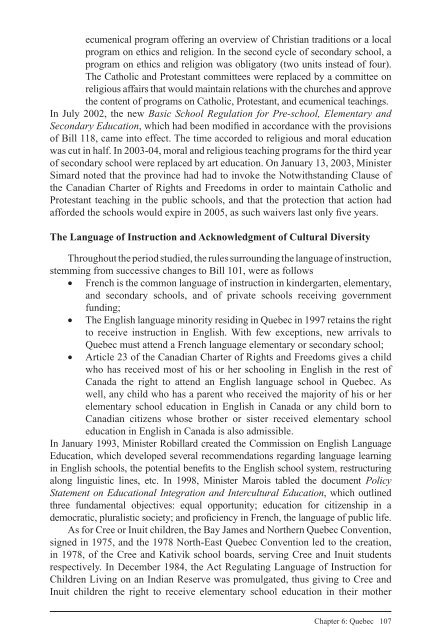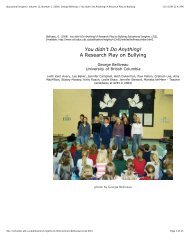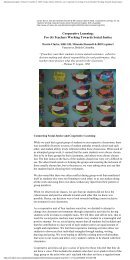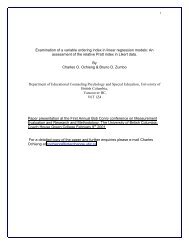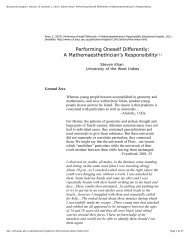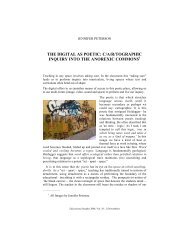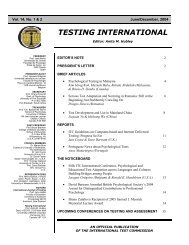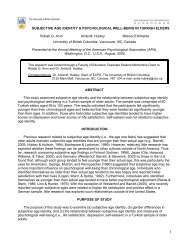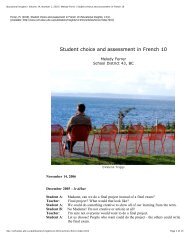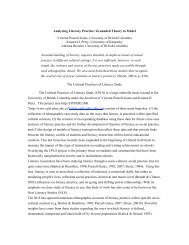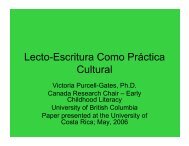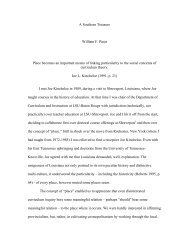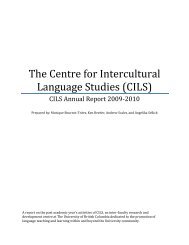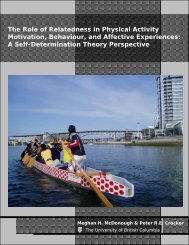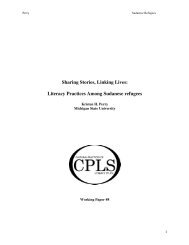The evolution of professionalism - Centre for Policy Studies in ...
The evolution of professionalism - Centre for Policy Studies in ...
The evolution of professionalism - Centre for Policy Studies in ...
You also want an ePaper? Increase the reach of your titles
YUMPU automatically turns print PDFs into web optimized ePapers that Google loves.
ecumenical program <strong>of</strong>fer<strong>in</strong>g an overview <strong>of</strong> Christian traditions or a local<br />
program on ethics and religion. In the second cycle <strong>of</strong> secondary school, a<br />
program on ethics and religion was obligatory (two units <strong>in</strong>stead <strong>of</strong> four).<br />
<strong>The</strong> Catholic and Protestant committees were replaced by a committee on<br />
religious affairs that would ma<strong>in</strong>ta<strong>in</strong> relations with the churches and approve<br />
the content <strong>of</strong> programs on Catholic, Protestant, and ecumenical teach<strong>in</strong>gs.<br />
In July 2002, the new Basic School Regulation <strong>for</strong> Pre-school, Elementary and<br />
Secondary Education, which had been modifi ed <strong>in</strong> accordance with the provisions<br />
<strong>of</strong> Bill 118, came <strong>in</strong>to effect. <strong>The</strong> time accorded to religious and moral education<br />
was cut <strong>in</strong> half. In 2003-04, moral and religious teach<strong>in</strong>g programs <strong>for</strong> the third year<br />
<strong>of</strong> secondary school were replaced by art education. On January 13, 2003, M<strong>in</strong>ister<br />
Simard noted that the prov<strong>in</strong>ce had had to <strong>in</strong>voke the Notwithstand<strong>in</strong>g Clause <strong>of</strong><br />
the Canadian Charter <strong>of</strong> Rights and Freedoms <strong>in</strong> order to ma<strong>in</strong>ta<strong>in</strong> Catholic and<br />
Protestant teach<strong>in</strong>g <strong>in</strong> the public schools, and that the protection that action had<br />
af<strong>for</strong>ded the schools would expire <strong>in</strong> 2005, as such waivers last only fi ve years.<br />
<strong>The</strong> Language <strong>of</strong> Instruction and Acknowledgment <strong>of</strong> Cultural Diversity<br />
Throughout the period studied, the rules surround<strong>in</strong>g the language <strong>of</strong> <strong>in</strong>struction,<br />
stemm<strong>in</strong>g from successive changes to Bill 101, were as follows<br />
• French is the common language <strong>of</strong> <strong>in</strong>struction <strong>in</strong> k<strong>in</strong>dergarten, elementary,<br />
and secondary schools, and <strong>of</strong> private schools receiv<strong>in</strong>g government<br />
fund<strong>in</strong>g;<br />
• <strong>The</strong> English language m<strong>in</strong>ority resid<strong>in</strong>g <strong>in</strong> Quebec <strong>in</strong> 1997 reta<strong>in</strong>s the right<br />
to receive <strong>in</strong>struction <strong>in</strong> English. With few exceptions, new arrivals to<br />
Quebec must attend a French language elementary or secondary school;<br />
• Article 23 <strong>of</strong> the Canadian Charter <strong>of</strong> Rights and Freedoms gives a child<br />
who has received most <strong>of</strong> his or her school<strong>in</strong>g <strong>in</strong> English <strong>in</strong> the rest <strong>of</strong><br />
Canada the right to attend an English language school <strong>in</strong> Quebec. As<br />
well, any child who has a parent who received the majority <strong>of</strong> his or her<br />
elementary school education <strong>in</strong> English <strong>in</strong> Canada or any child born to<br />
Canadian citizens whose brother or sister received elementary school<br />
education <strong>in</strong> English <strong>in</strong> Canada is also admissible.<br />
In January 1993, M<strong>in</strong>ister Robillard created the Commission on English Language<br />
Education, which developed several recommendations regard<strong>in</strong>g language learn<strong>in</strong>g<br />
<strong>in</strong> English schools, the potential benefi ts to the English school system, restructur<strong>in</strong>g<br />
along l<strong>in</strong>guistic l<strong>in</strong>es, etc. In 1998, M<strong>in</strong>ister Marois tabled the document <strong>Policy</strong><br />
Statement on Educational Integration and Intercultural Education, which outl<strong>in</strong>ed<br />
three fundamental objectives: equal opportunity; education <strong>for</strong> citizenship <strong>in</strong> a<br />
democratic, pluralistic society; and pr<strong>of</strong>i ciency <strong>in</strong> French, the language <strong>of</strong> public life.<br />
As <strong>for</strong> Cree or Inuit children, the Bay James and Northern Quebec Convention,<br />
signed <strong>in</strong> 1975, and the 1978 North-East Quebec Convention led to the creation,<br />
<strong>in</strong> 1978, <strong>of</strong> the Cree and Kativik school boards, serv<strong>in</strong>g Cree and Inuit students<br />
respectively. In December 1984, the Act Regulat<strong>in</strong>g Language <strong>of</strong> Instruction <strong>for</strong><br />
Children Liv<strong>in</strong>g on an Indian Reserve was promulgated, thus giv<strong>in</strong>g to Cree and<br />
Inuit children the right to receive elementary school education <strong>in</strong> their mother<br />
Chapter 6: Quebec 107


